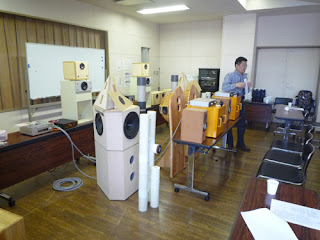My presentation at RILSRT on 23rd September, 2010

Here is myself. I presented three types of MDOF-CR(Multiple-Degree of Freedom Cavity Resonator) applications. Three applications are: 1) Standard MCAP-CR 2) CBS-CR 3) AICC-CR These are true MDOF-CR applications. More detailed information is in Japanese only. I will upload them in English later. When? I am not sure.. These applications have exactly the same appearances as in the left photographs. These applications impressed the attendees because of powerful low frequency response with small 3" full-range drivers (TB W3-881SJ).

